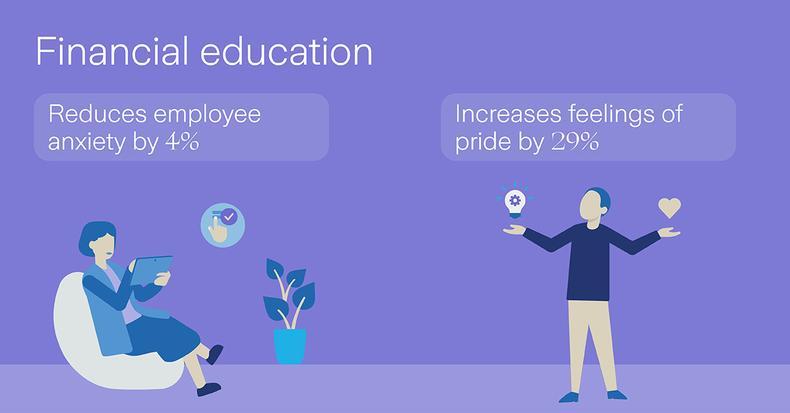Financial education eases employees’ anxieties about retirement planning
The challenges employees face in an uncertain world are unique when compared to previous generations.
For working people of all ages, social, economic and political factors have magnified the anxieties they have when making decisions about careers, personal finances and retirement plans.
But financial education is having an impact on easing these fears by giving employees the skills, tools and knowledge they need.
From the rising cost of living and retiring, through to concerns about the future impact of AI on their employment prospects, it’s not surprising there’s a high level of financial anxiety among employees.
Encouraging signs
Research published in an annual Nudge report in 2022 showed that around 70% of workers of all ages felt anxious about their financial situation.
But the 2024 research from the same source shows some encouraging signs that financial education is having an impact with positive sentiments about money rising and negativity decreasing.
The 2024 data shows three interesting year-on-year changes regarding financial sentiments:
- Feelings of anxiety down by 4%
- Feelings about being proud and hopeful up by 29% and 11% respectively.

This is good news for employers because employees who have anxieties about their personal finances are more likely to be distracted and therefore not achieve their full potential.
In this context there are duty of care issues from a best practice and moral perspective.
Numerous studies also show that anxious, unhappy employees are less productive, so these issues affect the bottom line too.
All of this has a bearing on the factors HR managers must consider when choosing their company’s employee benefits provider.
Huge differences
Drawing on Zurich’s global expertise and experience both as an employer and employee benefits provider, it’s clear that while there can be huge differences in employee’s education and attitudes towards tech, there is a common theme of financial anxiety across all age groups.
Employers have a duty to ensure the benefits providers they choose are equipped to address these concerns by empowering their people through knowledge, education and tools that provide practical help to improve their financial wellbeing.
This is why more and more companies are investing in apps and other technologies to make understanding and managing personal finances easier and accessible to all.
Empowering people
For employees who have grown up in the smartphone and video gaming age, it’s important to make it fun too.
Making financial and retirement planning decisions is a serious business and shouldn’t be treated lightly.
User-friendly platforms can be ideal for empowering people in a fun and engaging way.
By combining behavioral psychology, data and personalized education, this type of platform enables users develop their financial skills in a way that overcomes the view that financial planning is complex, difficult and time consuming.
It's a great example of how well-designed tools can overcome negative perceptions that can create barriers to customer engagement.
By ‘gamifying’ the process of understanding, managing, and making decisions about personal finances it's possible to make it feel less like a chore that has to be done, and more like a task that’s worth doing because it provides peace of mind.
The more people enjoy it, of course, the more likely they are to continue with regular engagement.
Shaping the future
For employers looking to recruit or retain Gen Z employees, this type of financial education platform is essential to engage effectively with the first generation to have grown up entirely in the digital age.
It’s worth noting that by 2025 it’s estimated that ‘Gen Z’ (those born between 1995 and 2005) will account for approximately 27% of the global workforce, rising to around 31% in 2035 when they will total two billion people worldwide.
This generation will shape the future, and inevitably they will gravitate towards employers who provide the support they need, and steer clear of those that don’t.
At Zurich we can see first-hand how our Gen Z colleagues are helping to create a bright future for the business, and how employee benefits solutions which feature financial education are already helping employers to recruit and retain the best people from this age group.
Before the current decade ends, employees from Gen Alpha (those born since 2010) will start to join the global workforce too.
This generation’s formative years have already included a global pandemic, the multiple challenges posed by social media, and of course the numerous impacts of the climate crisis.
The pandemic alone severely disrupted the education of many in this age group, further emphasising the need to prepare the ground for when they start their careers and need more support to make the best decisions about their financial future.
While it’s always important to look ahead, employers also need to focus on the present and immediate future, such as employees nearing retirement who can also benefit from financial education tools.
Conclusion
All forward-thinking employers understand the advantages of having a happy, healthy and confident workforce – and HR managers know that an employee benefits package which includes tools that empower their colleagues are a sound investment.
Many are seeing returns on that investment already, and all the signs are those returns will increase in the decades ahead.
Supplied by REBA Associate Member, Zurich
At Zurich, we’re proud to have been providing UK insurance for over 100 years. Whatever you’re looking to support or protect, we’ll do our best to help you.








